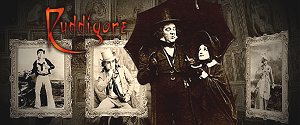You are here: > > Reviews
Reviews of performances of Ruddigore by the D'Oyly Carte Opera Company
from the Manchester Guardian
6th November, 1937
It is incomprehensible that "Ruddigore" should ever have been considered less attractive than the other comic operas in the Savoy series. The libretto gives us Gilbert at his wittiest, and in the music we hear Sullivan not only in his most tuneful vein but also as a master of more subtle rhythms than he commands elsewhere. Moreover, the parody is one that all can enjoy to the full, for here the satire is not pointed at a coterie, nor at this or that æsthetic movement, but at the absurdities of a melodramatic tradition which is nearly as old as the stage itself. And the delight and laughter were probably not less hearty when the work was produced than they are now, though Gilbert's caricature was as powerless to kill the Adelphi drama of his time as Gluck's and Wagner's reforms have been to spoil the old Italian conventions for lovers of "grand" opera.
Last night at the Manchester Opera House the performance was carried through with a grace and stylishness altogether admirable. Easefulness was kept throughout action, song, and dialogue, yet there was no suggestion that routine had robbed the actors of freshness or of pleasure in building up a piquant ensemble. Mr. Martyn Green, Mr. Sydney Granville, and Mr. Darrell Fancourt exploited all the humour of the inimitable Murgatroyd clan, and Mr. Radley Flynn, as the faithful follower, played up to his colleagues in a way which enhanced their parts and brought distinction to his own. Miss Brenda Bennett was prim, Miss Evelyn Gardiner was dignified, Miss Marjorie Eyre was freakish, the obliging bridesmaids were elegant — and Mr. John Dean flitted about among all these characters with a zest that made him as much a favourite with us as with them. The ghost song in the second act is, of course, unique — a movement that transcends anything done before or since in comic opera and that sounds the macabre note as surely in its music as in its words. Alas that the D'Oyly Carte Company, while lavish in its provision for the stage practises a strange economy in the matter of the orchestra! But Mr. Isidore Godfrey does wonders with the forces under his baton, and last night there were many felicities in the playing.
G.A.H.
GOOD FUN AND GHOSTS
9th January, 1962
The theatre was again packed and wiseacres were saying how good it was to see this opera (of all of them) so keenly attended. Because there has been since the start a slight jinx on Ruddigore, or Ruddygore as it was on the first night (the title was quickly modified, for an audience that kept that adjective exclusively for the boy David's complexion in Saul II) — that first night when, incredibly mingling with the cheers, came the sibilant sound of disapproval. What caused it? A demonstration against Lord Randolph Churchill, said some. Others, including the second Mrs. D'Oyly Carte thought that a reference to the "Supreme Court" had been misheard as "Supreme Being" and it was thought that Gilbert — while Sir Arthur of course was writing music fit for Hymns Ancient and Modern — was somehow being blasphemous. But the probable truth is simply that a lot of people would have liked The Mikado to [go] on running for ever, and the new piece was hardly yet welcome.
There is some tedium in it, some of that olde-worlde minueting which was to express itself pictorially in the pictures of Kate Greenaway and Marcus Stone. But most of it is very good fun and the famous ghost music conducted on the first night by Sir Arthur in the dark, using a baton with a luminous tip (a notion picked up from the Kaiser's manoeuvres!) still has power to make the children at least clutch their hot cheeks. I will not be so bold as to say that this part of it stirred me more than last week's new "Magic Flute" (though the fun, in Savoy mincing manners, was more fun that the German by Welsh and Australians at Covent Garden). What is interesting for people who like opera is to see where this effort at "fright music" stands in relation to the third act of "Mireille," a work of Gounod's which surely has been at the back of Sullivan's mind when composing some of this opera.
The performance under Isidore Godfrey is a good one at least on the the choral, orchestral and male side. And since the fashion is for dishing out marks, I give an alpha plus for the intonation in the madrigal. Kenneth Sandford gives a fine body of villainy to Sir Despard, John Reed as Sir Ruthven is a little overparted in the second act, but has all the words and the business so well in control that one never felt any serious inadequacy. The Dick Dauntless is Thomas Round who, I understand, has only just assumed this role but does it with much spirit (would a cynic think that could be the reason why?), Donald Adams curdles the blood as he steps from his frame to sing of the Ghost's High Noon.
Yes, the men are excellent. Joyce Wright sets about Mad Margaret with a will and Mary Sansom is a nice healthy looking Rose Maybud. But she ought to make more of the chances — there's a lilt in that first 'Etiquette' song which should be a matter of sink or swim. Get it going and the audience is yours for the rest of the evening. Little things count.
Philip Hope-Wallace
Page modified 26 August 2011
